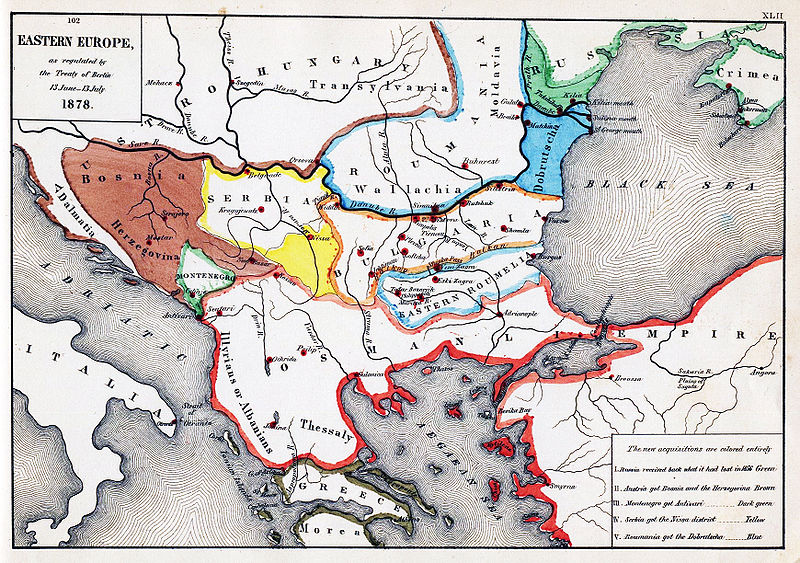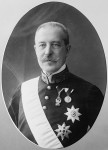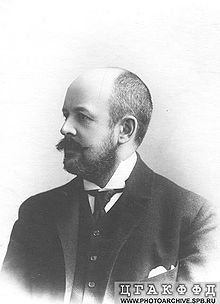You can catch up on the earlier posts in this series here (now with hopefully helpful descriptions):
- Why it’s so difficult to answer the question “Who is to blame?”
- Looking back to 1814
- Bismarck, his life and works
- France isolated, Britain’s global responsibilities
- Austria, Austria-Hungary, and the Balkan quagmire
- The Anglo-German naval race, Jackie Fisher, and HMS Dreadnought
- War with Japan, revolution at home: Russia’s self-inflicted miseries
- The First Balkan War
- The Second Balkan War
- The Entente Cordiale, Moroccan crises, and the influence of public opinion
We left the Austro-Hungarian Empire in a state of ferment back in part five, having undergone a near-death constitutional stroke in 1867, resulting in a bi-polar domestic and even world outlook to accommodate the newly redefined Dual Monarchy, and dangerously inconsistent treatment of their respective ethnic, linguistic, and religious minorities in the Cisleithanic (Austrian) and Transleithanic (Hungarian) “halves” of the empire. This might not have mattered much in the long run if the empire hadn’t been summarily extended in 1908 with the addition of new territory on the southern border of the empire.
Administration turns into annexation
Under the terms of the 1878 Treaty of Berlin, Austria-Hungary had been administering the Ottoman provinces of Bosnia and Herzegovina, with the provision that they would be returned at some future date when the stability of the occupied territories had been re-established. In 1908, however, something happened which drove the Austro-Hungarians into a panic: the somnolent Ottoman government was faced with a revolutionary movement called the Young Turks.
Since 1878, the Sultan had ruled without a parliament, having suspended the General Assembly and ending the short-lived First Constitutional Era. The Young Turks were an unlikely alliance of Turkish nationalists, reformers, pro-Western modernizers, and certain national minorities including Armenians and Greeks: in short, anyone with a grievance against the Sultan, the administration, or the general state of life in the empire. The Young Turks forced the Sultan to restore the 1876 constitution and recall the general assembly. They also announced plans to call elections throughout the empire, including the Austrian-occupied territories.

Map of South-Eastern Europe after the Congress of Berlin, 1878 (via Wikipedia)

Austro-Hungarian foreign minister Count Alois von Aehrenthal (via Wikipedia)
Bosnia and Herzegovina had no existing representation of any sort — with the Ottomans or with the Austrians — and it was feared that the Young Turks, having created representation in the two
vilayets would then demand their return to Ottoman control. Austria’s foreign minister,
Count Alois von Aehrenthal began to make urgent plans to annex Bosnia and Herzegovina. In
The Sleepwalkers, Christopher Clark outlines Aehrenthal’s actions:
In order to forestall any such complications [a push by the Young Turks to reclaim the provinces], Aehrenthal moved quickly to prepare the ground for annexation. The Ottomans were bought out of their nominal sovereignty with a handsome indemnity. Much more important were the Russians, upon whose acquiescence the whole project depended. Aehrenthal was a firm believer in the importance of good relations with Russia — as Austrian ambassador in St. Petersburg during the years 1899-1906, he had helped to consolidate the Austro-Russian rapprochement. Securing the agreement of the Russian foreign minister, Alexandr Izvolsky, was easy. The Russians had no objection to the formalization of Austria-Hungary’s status in Bosnia-Herzegovina, provided St. Petersburg received something in return. Indeed it was Izvolsky, with the support of Tsar Nicholas II, who proposed that the annexation of Bosnia-Herzegovina be exchanged for Austrian support for improved Russian access to the Turkish Straits.

Russian foreign minister Count Alexandr Petrovich Izvolsky (via Wikipedia)
In 1908, having successfully negotiated Russian support for the move, Austria-Hungary swallowed the two provinces and added them to the empire. Then things went horribly, horribly wrong for Aehrenthal and Austria-Hungary. The reaction to annexation was far more angry and widespread than Aehrenthal had expected, the other Treaty signatories demanded answers … and Izvolsky bolted for cover:
Despite these preparations, Aehrenthal’s announcement of the annexation on 5 October 1908 triggered a major European crisis. Izvolsky denied having reached any agreement with Aehrenthal. He subsequently even denied that he had been advised in advance of Aehrenthal’s intentions, and demanded that an international conference be convened to clarify the status of Bosnia-Herzegovina.
In his recent article in History Today, Vernon Bogdanor explains the reaction to this less-than-legal Austro-Hungarian swallowing act:
The annexation […] was a breach of the treaty and of international law. It would have significant consequences. The first was that it made non-Slav rule in Bosnia appear permanent, since the Austro-Hungarian Empire was far more durable than the Ottoman Empire. The annexation was a particular blow to the independent south Slav state of Serbia, which objected. Second, the annexation made the southern Slav issue an international problem, since it involved Serbia’s ally, Russia, which saw itself as the protector of the Slavs. In March 1909 Austria demanded, under threat of war, that Serbia accept the annexation, while Germany told Russia that, in case of war, it would take Austria’s side.
Britain helped persuade Serbia and Russia to back down. The great powers accepted the annexation. The Kaiser, unwisely perhaps, boasted in Vienna in 1910 that he had come to Austria’s side as a ‘knight in shining armour’.
The deciding factor in settling the issue of annexation turned out to be the active involvement of the German government in providing diplomatic pressure on Russia, as Christopher Clark explains:
The issue was resolved only by the “St. Petersburg note” of March 1909, in which the Germans demanded that the Russians at last recognize the annexation and urge Serbia to do likewise. If they did not, Chancellor Bülow warned, then things would “take their course”. This formulation hinted not just at the possibility of an Austrian war on Serbia, but, more importantly, at the possibility that the Germans would release the documents proving Izvolsky’s complicity in the original annexation deal. Izvolsky immediately backed down.
At the time, Aehrenthal took the blame for this fiasco, at least to some degree for his preference for secret deals and understandings. He may have been correct that there was no chance that the other signatories to the Treaty of Berlin would accept the Austrian proposal, but when it all became public, it tarnished his reputation directly and Austria-Hungary’s reputation generally.
Russia hardly came out improved in standing either. As Christopher Clark put it, “the evidence suggests that the crisis took the course that it did because Izvolsky lied in the most extravagant fashion in order to save his job and reputation.” This embarrassing incident at least partially explains why Russia became far more concerned about the fate of the south Slavic populations — having signally failed them once in 1908, Russia could not afford to look like they were going to fail them in future conflicts without forfeiting any influence or control over events in the Balkans. Clark explains the toxic combination of official misinformation, rising political awareness of the Russian middle classes, and the indirect power of the newspapers:
Intense public emotions were invested in Russia’s status as protector of the lesser Slavic peoples, and underlying these in the minds of the key decision-makers was a deepening preoccupation with the question of access to the Turkish Straits. Misled by Izvolksy and fired up by chauvinist popular emotion, the Russian government and public opinion interpreted the annexation as a brutal betrayal of the understanding between the two powers, an unforgivable humiliation and an unacceptable provocation in a sphere of vital interest. In the years that followed the Bosnian crisis, the Russians launched a programme of military investment so substantial that it triggered a European arms race.
Another important question in the wake of the annexation crisis was how Austria-Hungary would placate Serbia. Margaret MacMillan, in The War That Ended Peace outlines the rather small pickings Serbia was offered:
The most difficult issue to settle in the aftermath of the annexation was the question of compensation for Serbia, complicated by the fact that Russia was backing Serbia’s demands and Germany was supporting Austria-Hungary. The most Aehrenthal was prepared to offer Serbia was some economic concessions such as access to a port on the Adriatic, but only if Serbia recognized the annexation and agreed to live on peaceful terms with Austria-Hungary. The Serbian government remained intransigent and, as spring melted the snows in the Balkans, the talk of war mounted again around Europe’s capitals. […] In St. Petersburg, Stolypin, who remained opposed to war, told the British ambassador at the start of March that Russian public opinion was so firmly in support of Serbia that the government would not be able to resist coming to its defense: “Russia would have, in that case, to mobilise, and a general conflagration would then be imminent.”
War was averted in 1908, but the issues that arose (or were exacerbated) during the Bosnian crisis were almost all still significant in 1914. As a dress rehearsal, 1908 went down fairly well: only diplomatic force was exerted, but it showed some of the limits of mere diplomacy and foreshadowed the crisis of July 1914.




 The second preseason game for an NFL team tends to be a pretty pedestrian affair, as neither team likely has figured out their first and second strings completely, they’re still trying to integrate new draft picks and undrafted free agents, and they don’t game plan for the opponent. Despite that, you can occasionally get an entertaining, competitive game this early, and last night’s Vikings-Cardinals matchup at the University of Minnesota was quite entertaining.
The second preseason game for an NFL team tends to be a pretty pedestrian affair, as neither team likely has figured out their first and second strings completely, they’re still trying to integrate new draft picks and undrafted free agents, and they don’t game plan for the opponent. Despite that, you can occasionally get an entertaining, competitive game this early, and last night’s Vikings-Cardinals matchup at the University of Minnesota was quite entertaining.

